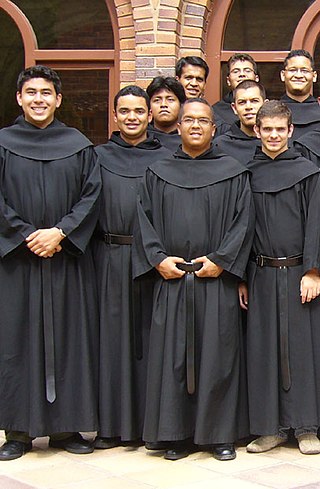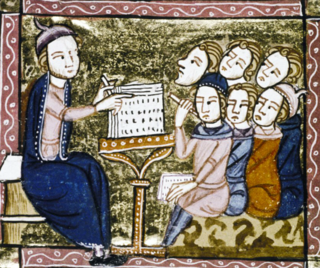Thomas of Eccleston was a thirteenth-century English Franciscan chronicler. He is known for De Adventu Fratrum Minorum in Angliam. It runs from 1224, when Franciscan friars first came to England, under Agnellus of Pisa, to about 1258. He styles himself simply "Brother Thomas" and John Bale seems to have first given him the title "of Eccleston".
He entered the Order of Friars Minor in about 1232 or 1233 and was a student at Oxford between 1230 and 1240. After 1240, he was at the London monastery, though he held no office there. [1]
The De Adventu is a collection of notes rather than a finished work. Incidentally it throws some light on the trend of early Franciscan events and thought in general.
For a period of twenty-six years, Eccleston was busy collecting material for his chronicle, which he based on personal knowledge, interviews, and documents no longer extant. He described the “heroic period” of the Franciscan movement in England. His chronicle lacks dates, is weak on chronological presentation, and gives preference to England, but is considered accurate and reliable in the content related to the Friars Minor in England. [1]
Though the original manuscript has been lost, there are four manuscripts of the “De Adventu” which are known to scholars. The chronicle was edited in the nineteenth century by J. S. Brewer in the “Monumenta Franciscana” (1858), by R. Howlett (1882), by the Friar Minors at Quaracchi (1885), and by Felix Lieberman in the “Monumenta Germaniae” (1885). A critical edition is lacking. Father Cuthbert, O.S.F.C., translated the work into English in 1903 under the title The Friars and How They Came to England, [1] and E. Gurney Salter rendered it in English in 1926 with the title The Coming of the Friars Minor to England and Germany. [2]

The Franciscans are a group of related mendicant religious orders of the Catholic Church. Founded in 1209 by the Italian saint Francis of Assisi, these orders include three independent orders for men, orders for nuns such as the Order of Saint Clare, and the Third Order of Saint Francis open to male and female members. They adhere to the teachings and spiritual disciplines of the founder and of his main associates and followers, such as Clare of Assisi, Anthony of Padua, and Elizabeth of Hungary. Several smaller Protestant Franciscan orders or other groups have been established since late 1800s as well, particularly in the Anglican and Lutheran traditions.

Matthew Paris, also known as Matthew of Paris, was an English Benedictine monk, chronicler, artist in illuminated manuscripts, and cartographer who was based at St Albans Abbey in Hertfordshire. He authored a number of historical works, many of which he scribed and illuminated himself, typically in drawings partly coloured with watercolour washes, sometimes called "tinted drawings". Some were written in Latin, others in Anglo-Norman or French verse. He is sometimes confused with the nonexistent Matthew of Westminster.

A friar is a member of one of the mendicant orders in the Roman Catholic Church. There are also friars outside of the Roman Catholic Church, such as within the Anglican Communion. The term, first used in the 12th or 13th century, distinguishes the mendicants' itinerant apostolic character, exercised broadly under the jurisdiction of a superior general, from the older monastic orders' allegiance to a single monastery formalized by their vow of stability. A friar may be in holy orders or be a non-ordained brother. The most significant orders of friars are the Dominicans, Franciscans, Augustinians, and Carmelites.

Luke Wadding, O.F.M., was an Irish Franciscan friar and historian.

Nicholas Trivet was an English Anglo-Norman chronicler.

Agnellus of Pisa, was an Italian Franciscan friar. As its first Minister Provincial in England (1224–1236), he is considered the founder of the Franciscans in England. His feast day is variously observed in the Catholic church on 7 May or 10 September.

Salimbene di Adam, O.F.M., was an Italian Franciscan friar, theologian, and chronicler. Salimbene was one of the most celebrated Franciscan chroniclers of the High Middle Ages. His Cronica is a fundamental source for Italian history of the 13th century.

The Chronicle of Fredegar is the conventional title used for a 7th-century Frankish chronicle that was probably written in Burgundy. The author is unknown and the attribution to Fredegar dates only from the 16th century.
Walter Hilton, Can. Reg. was an English Augustinian mystic, whose works gained influence in 15th-century England and Wales. He is commemorated by the Church of England and by the Episcopal Church in the United States.
Haymo of Faversham, O.F.M. was an English Franciscan scholar. His scholastic epithet was Inter Aristotelicos Aristotelicissimus, referring to his stature among the Scholastics during the Recovery of Aristotle amid the 12th- and 13th-century Renaissance. He acquired fame as a lecturer at the University of Paris and also as a preacher when he entered the Order of Friars Minor, probably in 1224 or 1225. He served as the Minister Provincial for England (1239–1240) and as the Minister General of the Order .

Elias of Cortona was a close associate of Saint Francis of Assisi and one of the earliest followers to join the newly founded Order of Friars Minor. A lay brother, he rose to positions of significant leadership within the order, serving as both vicar general and minister general. Saint Francis himself appointed Elias vicar general in 1221.
Bernard of Besse was a French Friar Minor and chronicler.

John Colgan, OFM, was an Irish Franciscan friar noted as a hagiographer and historian.

Albert of Pisa, O.Min., was an Italian Franciscan friar. He served as minister provincial for Germany, Hungary, and England. In 1239, he was elected Minister General of the Order.
Anthony Parkinson was an English Franciscan friar and historian of his Order.
William of Nottingham, OFM, was an English Franciscan friar who served as the fourth Minister Provincial of England (1240–1254).

William of Nottingham, OFM was an English Franciscan friar who served as the seventeenth Minister Provincial of England .

The Abbey of the Minoresses of St. Clare without Aldgate was a monastery of Franciscan women living an enclosed life, established in the late 13th century on a site often said to be of five acres, though it may have been as little as half that, at the spot in the parish of St. Botolph, outside the medieval walls of the City of London at Aldgate that later, by a corruption of the term minoresses, became known as The Minories, a placename found also in other English towns including Birmingham, Colchester, Newcastle upon Tyne and Stratford-upon-Avon.
Andrew George Little was an English historian, specialising in the Franciscans in medieval England. He was Professor of History at the University College of South Wales, Cardiff, between 1898 and 1901. He was thereafter a visiting lecturer (1903–20) and then reader (1920–32) in palaeography at the University of Manchester. He was president of the Historical Association from 1926 to 1929, and was elected a Fellow of the British Academy in 1922.

Emma Gurney Salter (1875–1967) was an English historian and translator who wrote especially on Renaissance history and art and introduced several texts connected with Francis of Assisi to an English-speaking audience for the first time.